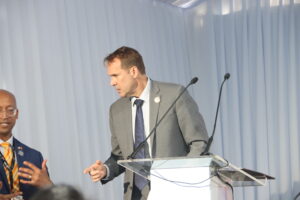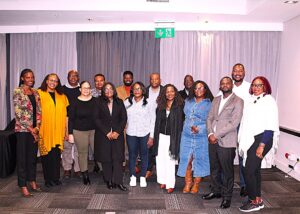Zimbabwe’s government, under Emmerson Mnangagwa, has steadily intensified its crackdown on dissent. Far from the reformist image he attempted to project after long-serving former president Robert Mugabe’s unceremonious 2017 ouster, Mnangagwa has led a regime characterised by the weaponisation of law, suppression of opposition, and an unrelenting assault on press freedom.
By Herbert Moyo
Coming as it did, just three days after the World Press Freedom Day commemorations, the recent granting of bail to Zimbabwean investigative journalist Blessed Mhlanga should not be mistaken for a shift towards a more tolerant regime that is beginning to embrace democratic norms of a free press, justice or judicial independence.
Rather, it is likely a begrudging concession to local and international pressure by a regime bent on cowing journalists, and crushing any form of dissent and freedom of expression. It could even be an act sanctioned by an administration that believes that Mhlanga’s long and unjustified incarceration has served its purpose of sufficiently intimidating other journalists and showing them the fate that awaits them should they ever diligently exercise their duties of covering and giving a platform to dissenting voices.
Mhlanga was arrested on 24 February 2025 and detained for a staggering 72 days. His supposed crime? Broadcasting his interview with ruling Zanu-PF party Central Committee member and war veteran Blessed Geza, who excoriated President Emmerson Mnangagwa for alleged corruption and gross violation of the constitution, and demanded his resignation. For simply giving a platform to dissenting views — a cornerstone of journalistic duty — Mhlanga was charged under the Criminal Law (Codification and Reform) Act for allegedly “inciting violence”. His case was investigated not just by the regular police, but by the Counter-Terrorism Unit — a worrisome escalation that reveals the paranoid Zimbabwean government’s dangerous conflation of journalism with terrorism.
Why this is important
- The context of his arrest is essential. Zimbabwe’s government, under Mnangagwa, has steadily intensified its crackdown on dissent. Far from the reformist image he attempted to project after long-serving former president Robert Mugabe’s unceremonious 2017 ouster, Mnangagwa has led a regime characterised by the weaponisation of law, suppression of opposition, and an unrelenting assault on press freedom. Mhlanga is just the latest in a long line of journalists subjected to arbitrary arrest, surveillance, physical attacks, and harassment. There is no reason to believe he will be the last.
It took three separate court appearances before Mhlanga was finally granted bail on 6 May 2025 by High Court Judge Gibson Mandaza. In arriving at his decision, Justice Mandaza cited “changed circumstances”, including the completion of the docket against Mhlanga and the passage of time. Yet these factors existed or were foreseeable from the beginning. Why, then, was bail denied repeatedly beforehand? Why did the courts parrot state claims that his release would “undermine peace and security” or lead to “witness interference”?
The judiciary’s role in Zimbabwe is increasingly controversial and suspect. Courts are supposed to be independent of other arms of the state. They ought to be bastions of justice and constitutional order. Yet many Zimbabweans now believe that they appear instead to operate as extensions of the executive. The opacity surrounding their decisions — especially in politically charged cases — erodes public trust. In Mhlanga’s case, the lack of substantive reasoning behind both the initial bail denials and the eventual approval fuels suspicions of political interference. The timing of the bail, just three days after World Press Freedom Day commemorations, also suggests the regime and the courts may have bowed to rising international condemnation and local civil society pressure.
Abnormality of Zimbabwe’s political environment
That Zimbabweans and press freedom advocates around the world must breathe a collective sigh of relief over bail being granted is a testament to the debasement and abnormality of Zimbabwe’s legal and political environment. In any functioning democracy, bail is not a privilege to be celebrated — rather, it is a constitutional right. But under Mnangagwa, Zimbabwe has been reduced to a country where even basic liberties are luxuries dispensed by the state in dribs and drabs, very much like the state and its cronies distribute educational opportunities, farming inputs, healthcare and other essential services to a few chosen bootlickers.
Mhlanga is out on bail, but we remain very far from a resolution. This is because the unwarranted charges against him remain in place. The sword still dangles, and the chilling message to other journalists remains the same — do your job at your peril. The broader climate of fear, persecution and repression of journalists, human rights activists and ordinary citizens persists.
More from Africa News 24
The government is not showing any signs of repenting from its nefarious agenda to frame independent journalism as a national security threat. By deploying the Counter-Terrorism Unit in Mhlanga’s case, the state sent a loud signal that it no longer distinguishes between terrorism and journalism. This dangerous narrative undermines press freedom and the public’s right to information and democratic participation.
Mhlanga’s ordeal fits into a broader pattern. Laws such as the Patriotic Act, the Maintenance of Peace and Order Act, and various provisions of the Criminal Law Act are frequently deployed not to maintain order, but to sanitise the persecution of real and imagined dissenters. Unsurprisingly, Zimbabwe has become a nation wherein fear suppresses truth, and repression is enforced through a veneer of legality.
Palpable irony
In all the regime’s machinations, there remains a palpable irony that cannot be ignored. Not too long ago, Mnangagwa immensely benefited from a courageous press. When he fell out of favour with Mugabe in 2017, it was the independent media — including Mhlanga — that provided him with a platform to air his views and remain politically relevant. Today, having entrenched himself in power, he has turned against the very institutions that once stood by him. This self-inflicted amnesia shows a leader and a government that is unwilling to tolerate accountability.
Mhlanga may be out of jail for now, but ordinary Zimbabweans, civil society, and media watchdogs must not allow themselves to be placated by this “victory”. Bail is not freedom. The charges against Mhlanga remain, and they should not. There is no legitimate case to answer. Journalism is not a crime. Conducting interviews is not terrorism. Asking difficult questions or broadcasting dissenting views is not a sedition. To allow these charges to stand is to endorse the regime’s dangerous narrative that independent journalism is a threat to national security.
We must remain vigilant because it is Not Yet Uhuru. We must continue the fight for justice. True justice will only be served when the charges against Mhlanga are dropped unconditionally. True justice will only be served when journalists can operate without fear of persecution, and when the legal system upholds its duty to protect, rather than punish, those who seek to inform the public. DM
Herbert Moyo is the Advocacy and Capacity-Building Director at Intelwatch.












